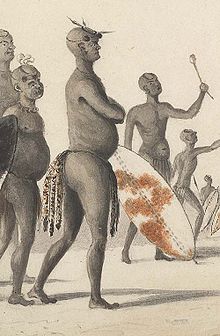Mzilikazi
| Mzilikazi Khumalo | |
|---|---|
| King of Matabeleland | |

King Mzilikazi, as portrayed by Captain William Cornwallis Harris, circa 1836
|
|
| Reign | ca. 1823 – 1868 |
| Coronation | ca. 1820 |
| Predecessor | Founder (father murdered; formerly a lieutenant of Zulu King Shaka) |
| Successor | Lobengula |
| Born | ca. 1790 Mkuze, South Africa |
| Died | 9 September 1868 Matabeleland, buried in a cave at Entumbane, Matobo Hills, Zimbabwe (on 4 November 1868) |
| Spouse | several wives |
| Issue | Lobengula (son), Nkulumane (son), and many others |
| House | Khumalo; founder of the Ndebele people |
| Father | Matshobana KaMangete (c. late 1700s – c. 1820s), |
| Mother | Nompethu KaZwide, daughter of Chief Zwide of the Ndwandwe people (tribe). |
Mzilikazi, pronounced as M-zee-lee-ka-zee(ca. 1790 – 9 September 1868), was a Southern African king who founded the Matabele kingdom (khumalo), Matabeleland, in what became Rhodesia and is now Zimbabwe. His name means "the path of blood". He was born the son of Matshobana near Mkuze, Zululand (now part of South Africa), and died at Ingama, Matabeleland (near Bulawayo, Zimbabwe). Many consider him to be the greatest Southern African military leader after the Zulu king Tshaka. David Livingstone, in his autobiography, referred to Mzilikazi as the second most impressive leader he encountered on the African continent.
He took his tribe, the Khumalo, on an 800 kilometres (500 mi) journey from the Zulu Kingdom to what is now called Zimbabwe. Along the way, he showed considerable statesmanship, as he was able to weld his own people and the many tribes he conquered into a large and ethnically diverse but centralised kingdom.
He was originally a lieutenant of Shaka but had a quarrel with him in 1823 and rebelled. Rather than face ritual execution, he fled northwards with his tribe. He first travelled to Mozambique but in 1826 he moved west into the Transvaal due to continued attacks by his enemies. As he conquered the Transvaal he absorbed many members of other tribes and established a military despotism, such as Mzilikazi's attacks in the Nzunza kraal at Esikhunjini, where the Nzunza king Magodongo and others were kidnapped and subsequently killed at Mkobola river.
For the next ten years, Mzilikazi dominated the Transvaal. This period, known locally as the Mfecane (crushing) was characterised by devastation and murder on a grand scale as Mzilikazi removed all opposition and remodelled the territory to suit the new Ndebele order. He used the method of scorched earth to keep distance to all surrounding kingdoms. The death toll has never been satisfactorily determined, but the region was so depopulated that the Voortrekkers were able to occupy and take ownership of the Highveld area without opposition in the 1830s.
...
Wikipedia
